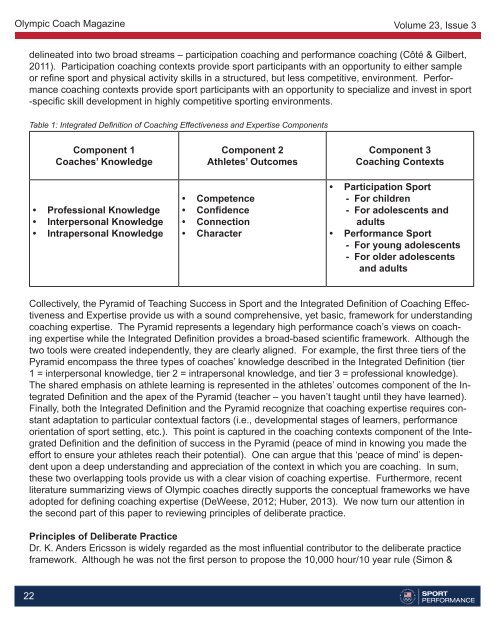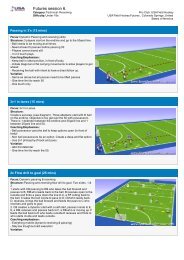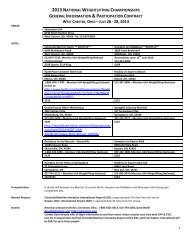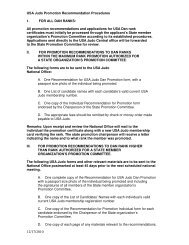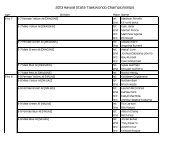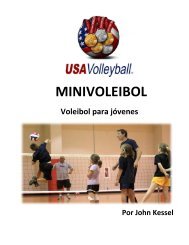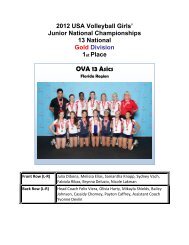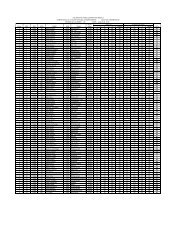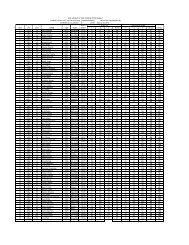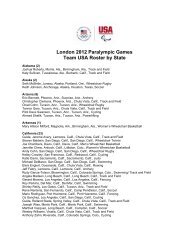OLYMPIC COACH - United States Olympic Committee
OLYMPIC COACH - United States Olympic Committee
OLYMPIC COACH - United States Olympic Committee
- TAGS
- olympic
- www.teamusa.org
You also want an ePaper? Increase the reach of your titles
YUMPU automatically turns print PDFs into web optimized ePapers that Google loves.
<strong>Olympic</strong> Coach Magazine<br />
22<br />
Volume 23, Issue 3<br />
delineated into two broad streams – participation coaching and performance coaching (Côté & Gilbert,<br />
2011). Participation coaching contexts provide sport participants with an opportunity to either sample<br />
or refine sport and physical activity skills in a structured, but less competitive, environment. Performance<br />
coaching contexts provide sport participants with an opportunity to specialize and invest in sport<br />
-specific skill development in highly competitive sporting environments.<br />
Table 1: Integrated Definition of Coaching Effectiveness and Expertise Components<br />
Component 1<br />
Coaches’ Knowledge<br />
• Professional Knowledge<br />
• Interpersonal Knowledge<br />
• Intrapersonal Knowledge<br />
Component 2<br />
Athletes’ Outcomes<br />
• Competence<br />
• Confidence<br />
• Connection<br />
• Character<br />
Component 3<br />
Coaching Contexts<br />
• Participation Sport<br />
- For children<br />
- For adolescents and<br />
adults<br />
• Performance Sport<br />
- For young adolescents<br />
- For older adolescents<br />
and adults<br />
Collectively, the Pyramid of Teaching Success in Sport and the Integrated Definition of Coaching Effectiveness<br />
and Expertise provide us with a sound comprehensive, yet basic, framework for understanding<br />
coaching expertise. The Pyramid represents a legendary high performance coach’s views on coaching<br />
expertise while the Integrated Definition provides a broad-based scientific framework. Although the<br />
two tools were created independently, they are clearly aligned. For example, the first three tiers of the<br />
Pyramid encompass the three types of coaches’ knowledge described in the Integrated Definition (tier<br />
1 = interpersonal knowledge, tier 2 = intrapersonal knowledge, and tier 3 = professional knowledge).<br />
The shared emphasis on athlete learning is represented in the athletes’ outcomes component of the Integrated<br />
Definition and the apex of the Pyramid (teacher – you haven’t taught until they have learned).<br />
Finally, both the Integrated Definition and the Pyramid recognize that coaching expertise requires constant<br />
adaptation to particular contextual factors (i.e., developmental stages of learners, performance<br />
orientation of sport setting, etc.). This point is captured in the coaching contexts component of the Integrated<br />
Definition and the definition of success in the Pyramid (peace of mind in knowing you made the<br />
effort to ensure your athletes reach their potential). One can argue that this ‘peace of mind’ is dependent<br />
upon a deep understanding and appreciation of the context in which you are coaching. In sum,<br />
these two overlapping tools provide us with a clear vision of coaching expertise. Furthermore, recent<br />
literature summarizing views of <strong>Olympic</strong> coaches directly supports the conceptual frameworks we have<br />
adopted for defining coaching expertise (DeWeese, 2012; Huber, 2013). We now turn our attention in<br />
the second part of this paper to reviewing principles of deliberate practice.<br />
Principles of Deliberate Practice<br />
Dr. K. Anders Ericsson is widely regarded as the most influential contributor to the deliberate practice<br />
framework. Although he was not the first person to propose the 10,000 hour/10 year rule (Simon &


